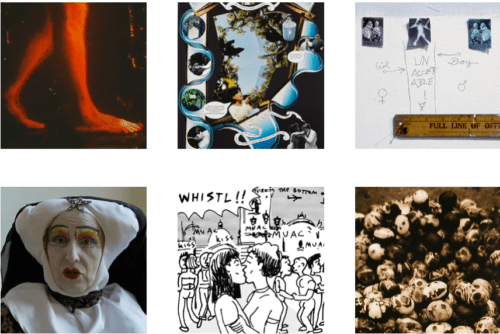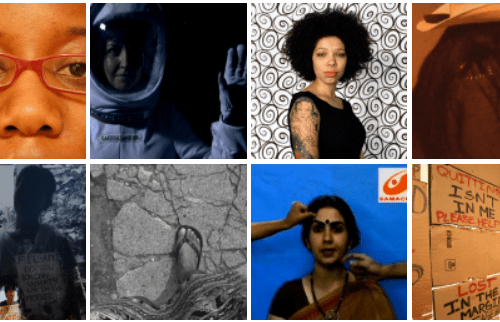“Just because there’s this umbrella, LGBT, we’re all grouped together.
But guess what? Someone poked a hole in the umbrella and the girls are still getting wet.”
—Miss Major
I first met Miss Major socially in 2005 at the apartment of a mutual friend in the Bay Area; her then boyfriend, 30 years her junior, was at her side. When I began interviewing her for this article, she gave me three different ages, all of them creatively explained. What I do know is that she is a 6’2” African American transgender woman, and I believe that she is in her mid-sixties. Most often, I’ve seen her with wavy, short, grey hair in the exact style of women in my family who go to hair salons weekly. Though she received a kidney transplant four years ago, she is an unrepentant sugar addict. But I truly began to appreciate Miss Major’s character and spirit when she told me that she self-identifies as a “glamour puss,” a descriptor uniquely her own. “I like to have the right style,” she said. “Paint the face, grab my heels, make sure my purse matches, and hit it. It’s Miss Major, spelled M-I-S-S.”
Our chance encounter turned into a friendship that has helped guide my path as an activist. The year after we met, when I undertook a project to document discrimination and violence against transgender people in US prisons, Miss Major was the first person I turned to for assistance. Opportunities to collaborate grew, and we later were among the organizers of Transforming Justice, a coalition gathering of lesbian, gay, bisexual, and transgender (LGBT) former prisoners, attorneys, and activists to develop national priorities toward ending the criminalization and imprisonment of transgender communities. A few years later, we reconnected in Barcelona, Spain, at a meeting of transgender advocates and allies dedicated to identifying local and global patterns of and remedies for human rights violations based on gender identity. As a thirty-five-year-old white, Jewish, queer woman assigned female at birth, my differences from Miss Major are many, but our connection runs deep. Coming from opposite ends of most spectrums, we are nonetheless two femme activists bound together by a mutual fascination with the pleasures and challenges of gender expression as well as a shared quest for social, political, and economic change. And so, I seek to convey some of the personal insights and professional wisdom that Miss Major has shared with me, an analysis that is too often sidelined by the US LGBT movement.
Now the executive director of the Transgender, Gender Variant, Intersex Justice Project (TGI Justice Project), Miss Major began her work decades ago. Assigned male at birth in Chicago in the 1940s, she was propelled by stigma, violence, and discrimination to become the recognized leader for transgender rights, economic justice, and prison abolition that she is today. She has been a sex worker, a welfare recipient, incarcerated, and homeless: realities that made her grasp early on that activism was essential to her own survival. In 1970, a friend of hers who was a Puerto Rican transwoman and sex worker was found dead in her apartment. Police ruled it a suicide despite ample evidence that a client murdered her. Miss Major explained:
Puppy’s murder made me aware that we were not safe or untouchable and that if someone does touch us, no one gives a shit. We only have each other. We always knew this, but now we needed to take a step towards doing something about it. So I started looking out for myself and the girls who worked on the street with me. We girls decided that whenever we got into a car with someone, another girl would write down as much information as possible. We would try not to just lean into the car window but get a guy to walk outside the car so that everyone could see him, so we all knew who he was if she didn’t come back. That’s how it started. Since no one was going to do it for us, we had to do it for ourselves. 1
This inherently radical yet utterly pragmatic practice of “doing for ourselves” has been the basis of the movement that Miss Major helped establish on those streets and continues to nurture and lead today. From her first survival-driven, vigilante-style activism on the streets of New York City, Miss Major’s lifelong work has been rooted in the determination to change the reality she knew. Drawing upon her personal knowledge, fierce compassion, and exceptional organizing skills, Miss Major is a leading advocate for transgender justice and a bold visionary for radical change. Because of the realities of the lives of transgender people, especially low-income transgender people of color, she argues that work to fulfill their human rights necessitates a focus on issues of incarceration, poverty, employment, substance abuse, health, and violence. Miss Major’s work spans these realms and ranges from personal support to legislative advocacy. As I’ve gotten to know her, it has become clear that her activism comes from a vision that only comes from lived experience and great tenacity—and it is this vision that can serve as a guide to all activists looking to build a stronger, better, and more inclusive queer movement.
Survival and Leadership: “Exposing the Truth of Life among the Forgotten”
Miss Major’s efficacy is integrally related to her system of values. She believes the people directly affected must lead their own movement. Any other scenario, she argues, is doomed to fail because allies do not possess the same expertise, stamina, and sense of urgency. While there is clearly also a role for allies to play, her point is in part designed to redress the wrongs of organizations and movements that have systematically excluded the most affected from leadership. As such, much of her work is guided by this desire to nurture new leaders. “We have to support them, not take over,” she explains. “They have to lead this.” This message is both empowering and revolutionary for those who are used to being ignored. Billie Cooper, an active member of TGI Justice Project, said: “Girls come from far and wide to get the knowledge Miss Major has to offer. She lets us know that we don’t have to be prostitutes or get beat by our husbands or do drugs; we can get jobs and have healthy relationships. She’s the one person who’s told us that we don’t have to settle for anything.” 2
Like many of the people she works with, Miss Major received welfare. She purchased most of her estrogen hormones on the black market. She has been homeless. She spent two decades generating the majority of her income through sex work and has done sex work periodically throughout most of her life. She is a survivor. Consequently, she has a deep understanding of community needs. She knows that seemingly minor challenges can add up to major barriers to receiving services and living healthier lives. Yoseñio Lewis has worked with Miss Major for seventeen years and witnessed her efforts to alleviate people’s burdens. He first met Miss Major when he served on the board of directors of the Tenderloin AIDS Resource Center (TARC). He reminisced:
Remember when Major made sure TARC had a refrigerator so homeless people could store food and meds that needed refrigeration? 3 Remember when she fought for a washer and dryer so that people could wash their clothes and not end up being turned away from services elsewhere because they stank or were too embarrassed to even try? Remember when Major de-escalated a client with her stories and humor, and at the same time kept a staff member and that client from physical harm? […] One big reason we DO know about [these issues] is because of Miss Major’s big mouth and willingness to expose the truth of life among the forgotten. 4
For the transgender women Miss Major works with, as in her own experience, even basic survival is a challenge. Social marginalization and economic oppression create a seemingly endless cycle of obstacles: unemployment, underemployment, homelessness, drug addiction, alcoholism, physical violence, sexual assault, police profiling, lack of health care, black market hormones, and imprisonment. She explains:
You say “get a job” like we can get one, but there’s no such thing if you can’t get work to maintain yourself, wash your body, have clean clothes, and feed yourself. What are you going to do if you have no way to pay for these things? You have to find something that’s outside of the law.
Having to deal with all that puts more pressure on you. The best way [for many] to deal with that pressure is to do drugs. Because if you’re high, you don’t give a shit.
Sex work was the most common thing for me because that’s what the older girls taught you to do. But this is because you don’t give us the opportunity. All of us do not hook or prostitute. But the concept is that we all do. So we’re at [the police’s] beck and call. If something happens and we’re in the vicinity, we get it. Someone attacks us, and we call the police, we end up going to jail, not the person who assaulted us. We’re profiled. You can’t even have a party with your friends without [police] pulling you over for hustling or loitering.
What do you think that tells a person? That you have no meaning. Society doesn’t give a damn about you. You’re the one who goes to prison and does time. 5
- Miss Major, personal interview, July 11-13, 2009, via phone. Transcripts on file with author.[↑]
- Billie Cooper, personal interview, July 15, 2009, via phone. Transcript on file with author.[↑]
- Yoseñio Lewis noted that Miss Major’s colleague, Hank Wilson, was also integral to getting TARC to provide refrigeration to its homeless clients.[↑]
- Yoseñio V. Lewis, personal interview, July 16, 2009, via email. Email on file with author.[↑]
- Miss Major, personal interview, July 11-13, 2009, via phone. Transcripts on file with author.[↑]



